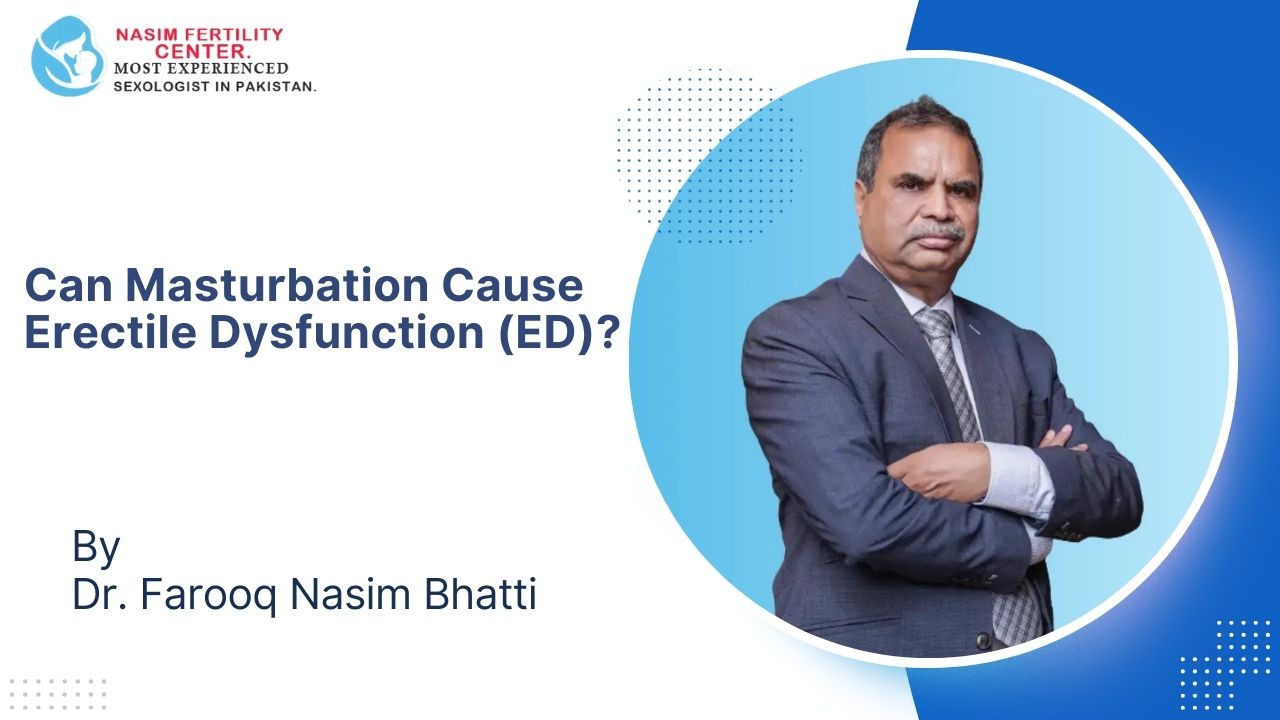
Masturbation, in itself, does not directly cause erectile dysfunction (ED). However, certain masturbation habits or underlying psychological factors associated with masturbation can contribute to ED in some individuals.
Masturbation is a natural and common aspect of human sexuality. It’s a topic that, despite its prevalence, often carries misconceptions and societal stigma. Among these misconceptions is the idea that masturbation directly causes erectile dysfunction (ED). Let’s dive into the science and psychology behind this topic to separate fact from fiction.
Understanding Erectile Dysfunction (ED)
Erectile dysfunction is the inability to achieve or maintain an erection sufficient for satisfactory sexual performance. ED can result from various factors, including medical conditions, psychological issues, lifestyle choices, and medications. It’s essential to understand that masturbation, in itself, does not directly cause ED. However, certain habits and psychological associations related to masturbation can contribute to erectile issues in some individuals.
Worried That Masturbation Is Causing ED? Let’s Set the Facts Straight
Get expert advice from Dr. Farooq Nasim Bhatti and understand what’s really affecting your sexual health.

Habits Linked to Masturbation That May Contribute to ED
1. Excessive Masturbation
Engaging in frequent or excessive masturbation can lead to:
- Desensitization of the Penis: Overstimulation may reduce sensitivity, making it challenging to achieve an erection during partnered sexual activity.
- Dopamine Tolerance: Masturbation releases dopamine, a neurotransmitter associated with pleasure. Excessive masturbation can lead to dopamine desensitization, potentially lowering libido and affecting erectile function.
2. Aggressive or Rough Masturbation
Using excessive force or pressure during masturbation can result in:
- Physical Injury: Damage to the penis or surrounding tissues can lead to temporary or long-term ED.
- Reduced Sensitivity: Over time, rough practices may cause desensitization, making it harder to achieve erections naturally.
3. Masturbation with Pornography
Excessive consumption of pornography during masturbation has its own set of challenges:
- Unrealistic Expectations: Pornography often portrays exaggerated scenarios that can create unrealistic standards, leading to dissatisfaction with real-life sexual experiences.
- Desensitization: Overexposure to visual stimuli can diminish arousal and make it harder to achieve erections during partnered intimacy.
4. Using Masturbation as a Coping Mechanism
Turning to masturbation as a way to deal with stress, anxiety, or other emotions may lead to:
- Psychological Dependency: Over-reliance on masturbation can interfere with the ability to form healthy sexual relationships.
- Mental Health Impact: Excessive reliance may exacerbate stress, anxiety, and self-esteem issues, indirectly contributing to ED.
Psychological Factors Associated with Masturbation and ED
1. Guilt or Shame
Cultural or religious beliefs often stigmatize masturbation, which can lead to:
- Anxiety: Negative emotions surrounding masturbation can result in performance anxiety during sexual activity.
- Stress: Guilt can create mental barriers that hinder arousal and erections.
2. Performance Anxiety
The pressure to achieve a certain level of arousal, even during masturbation, may manifest as:
- Partnered Anxiety: Stress during solo activity can translate into partnered encounters, affecting erectile function.
- Inhibited Arousal: Constant worry about performance can become a self-fulfilling prophecy.
3. Body Image Issues
Feelings of low self-esteem or negative body image can significantly impact sexual confidence, leading to:
- Reduced Sexual Desire: Lack of confidence can diminish interest in sexual activities.
- Erectile Challenges: Mental distractions related to appearance can impair the ability to achieve or maintain an erection.
Is Excessive Masturbation Impacting Your Erection Quality?
Consult Dr. Farooq Nasim Bhatti for a detailed evaluation and natural, non-judgmental treatment options.

The Role of Medical and Lifestyle Factors in ED
It’s important to highlight that ED often stems from medical conditions and lifestyle choices unrelated to masturbation. These include:
- Chronic Conditions: Diabetes, heart disease, and hypertension.
- Hormonal Imbalances: Low testosterone levels.
- Lifestyle Habits: Smoking, excessive alcohol consumption, and lack of exercise.
- Medications: Certain antidepressants and blood pressure medications.
When to Seek Professional Help
If you experience persistent or recurring erectile dysfunction, it’s crucial to consult a healthcare professional. They can evaluate underlying causes and provide appropriate treatment options tailored to your needs.
Does masturbation cause general body weakness?
Masturbation, in itself, does not directly cause general body weakness. However, excessive or compulsive masturbation can lead to physical and mental fatigue, which may contribute to feelings of weakness. Here are some possible reasons:
1. Physical exhaustion: Excessive masturbation can lead to physical exhaustion, particularly if it involves intense or prolonged sessions.
2. Sleep disturbances: Masturbation can interfere with sleep patterns, leading to fatigue, lethargy, and weakness.
3. Dehydration: Inadequate hydration can exacerbate fatigue and weakness. Masturbation can lead to increased heart rate and sweating, which may contribute to dehydration if not properly addressed.
4. Nutritional deficiencies: Excessive masturbation can lead to neglect of other aspects of life, including diet and nutrition. Poor nutrition can contribute to fatigue, weakness, and other health issues.
5. Hormonal imbalance: Excessive masturbation can disrupt hormonal balances, particularly testosterone and dopamine. Hormonal imbalances can contribute to fatigue, weakness, and other symptoms.
6. Mental health: Compulsive or excessive masturbation can be a symptom of underlying mental health issues, such as anxiety, depression, or obsessive-compulsive disorder. These conditions can contribute to feelings of weakness, fatigue, and emotional exhaustion.
7. Over-stimulation: Excessive masturbation can lead to over-stimulation of the nervous system, causing fatigue, weakness, and decreased sensitivity.
To maintain overall health and well-being, consider the following:
1. Practice moderation: Engage in masturbation in moderation, allowing time for rest and recovery.
2. Prioritize sleep: Ensure adequate sleep and maintain a consistent sleep schedule.
3. Stay hydrated: Drink plenty of water throughout the day.
4. Maintain a balanced diet: Focus on nutrient-rich foods, including fruits, vegetables, whole grains, lean proteins, and healthy fats.
5. Engage in regular exercise: Regular physical activity can help improve overall health, reduce fatigue, and increase energy levels.
6. Manage stress: Engage in stress-reducing activities, such as meditation, yoga, or deep breathing exercises.If you’re experiencing persistent fatigue, weakness, or other concerning symptoms, consult a healthcare professional to rule out underlying medical conditions.
Treatment of Sexual Weakness i.e. ED Caused by Masturbation?
Treating Erectile Dysfunction (ED) caused by masturbation requires a comprehensive approach, addressing physical, emotional, and psychological aspects. Here’s a step-by-step guide:Physical Treatment
1. Abstinence: Temporarily abstain from masturbation to allow your body to recover.
2. Exercise: Engage in regular exercise, such as cardio, strength training, and pelvic floor exercises (Kegel exercises), to improve overall health and erectile function.
3. Diet and nutrition: Focus on a balanced diet rich in fruits, vegetables, whole grains, lean proteins, and healthy fats. Avoid excessive sugar, salt, and unhealthy fats.
4. Sleep and relaxation: Prioritize adequate sleep (7-8 hours) and engage in stress-reducing activities, such as meditation, yoga, or deep breathing exercises.
Emotional and Psychological Treatment
1. Counseling: Consult a sex therapist, counselor, or psychologist to address underlying emotional and psychological issues, such as guilt, shame, or anxiety.
2. Mindfulness and self-awareness: Practice mindfulness techniques to increase self-awareness, recognizing triggers and patterns contributing to ED.
3. Stress management: Develop healthy coping mechanisms for managing stress, such as exercise, meditation, or hobbies.
4. Relationship counseling (if applicable): If you’re in a relationship, consider couples therapy to address communication, intimacy, and relationship dynamics.
Medical Treatment (if necessary)
1. Consult a healthcare professional: If ED persists, consult a healthcare professional to rule out underlying medical conditions, such as diabetes, high blood pressure, or hormonal imbalances.
2. Medications: In some cases, medications like phosphodiesterase type 5 inhibitors (PDE5 inhibitors) may be prescribed to help manage ED.
3. Hormone therapy: If hormonal imbalances are identified, hormone therapy may be recommended.Natural Remedies and Supplements
Prevention
1. Practice moderation: Engage in masturbation in moderation, allowing time for rest and recovery.
2. Maintain a healthy lifestyle: Focus on a balanced diet, regular exercise, and adequate sleep to support overall health and erectile function.
3. Address underlying issues: If you’re experiencing ED, address underlying emotional, psychological, and physical issues to prevent future occurrences.
Why Choose Dr. Farooq Nasim Bhatti for Masturbation or ED Treatment?
Dr. Farooq Nasim Bhatti is a leading expert in sexual health and erectile dysfunction treatment. Here’s why he stands out:
- Comprehensive Expertise: With years of experience, Dr. Farooq Nasim Bhatti provides best and personalized solutions addressing both physical and psychological aspects of ED. Dr. Farooq Nasim Bhatti is expert in treating Masturbation related issues.
- Pakistan’s Only Diplomate of the American Board of Sexology (USA), with comprehensive training in sexual dysfunction and reproductive health.
- MBBS, FAACS-Certified, with 31 years of clinical experience in treating sexual dysfunction and erectile dysfunction.
- Extensive Research: Dr. Farooq Nasim Bhatti has presented (more than 20) research papers on the treatment of sexual disorders at international conferences held in Germany, the USA, Turkey, Singapore, South Korea, Hong Kong, Malaysia, India, and Spain, where his work has been highly appreciated. These research papers can be read here.
- Customized Treatment Plans: Dr. Bhatti believes in tailored solutions that address the unique needs and circumstances of each patient.
- Compassionate Care: His compassionate, patient-centered approach ensures that individuals feel supported, respected, and empowered.
ED After Frequent Masturbation? Don’t Panic—Get Answers
Book a private consultation with Pakistan’s leading male health expert and regain confidence in your performance.

Frequently Asked Questions
Can masturbation permanently cause ED?
No, masturbation does not permanently cause ED. However, habits like excessive masturbation or psychological factors may contribute to temporary erectile challenges.
How often is it healthy to masturbate?
There’s no universal “right” frequency. It varies based on individual preferences and lifestyle. Moderation is key.
Can stopping masturbation improve ED?
If ED is linked to habits associated with excessive masturbation, reducing the frequency might help improve symptoms.
Does watching pornography always lead to ED?
No, but excessive consumption can create unrealistic expectations and reduce sensitivity to real-life stimuli.
Can rough masturbation cause permanent damage?
Aggressive masturbation can lead to injuries, but most are temporary. Chronic rough practices may result in lasting desensitization or scar tissue.
Should I feel guilty about masturbating?
No, masturbation is a natural and normal part of human sexuality. Guilt often stems from societal or cultural stigmas.
What medical treatments are available for ED?
Treatments include medications, lifestyle changes, counseling, and, in some cases, surgical interventions.
How can I improve my sexual health?
Adopt healthy habits like regular exercise, balanced nutrition, stress management, and avoiding excessive alcohol or smoking.
Can therapy help with ED?
Yes, counseling or therapy can address psychological factors such as anxiety, guilt, or relationship issues contributing to ED.
Is it safe to use supplements for ED?
Consult a healthcare provider before using supplements, as some may have side effects or interact with medications.
Conclusion
Masturbation, in moderation, is a normal and healthy expression of human sexuality. While it doesn’t directly cause erectile dysfunction, certain habits and psychological factors associated with masturbation can contribute to erectile challenges. Understanding these nuances and addressing underlying issues is vital for maintaining sexual health. If you’re experiencing persistent ED, seeking professional guidance can pave the way for effective treatment and improved well-being.
For expert advice and personalized care, consult Dr. Farooq Nasim Bhatti to regain control over your sexual health and confidence.
Disclaimer
This information is for educational purposes and not the treatment. For treatment, you need to consult the doctor.

Dr. Farooq Nasim Bhatti (MBBS, FAACS – USA, Diplomate: American Board of Sexology, CST, HSC – Hong Kong, CART – Malaysia & China) is a qualified medical sexologist with 30+ years of experience. He has presented 21+ research papers internationally and treats sexual dysfunction through sex therapy, counseling, and pharmacotherapy to restore natural sexual function without temporary medication.

Regain Confidence with Our ED Solutions
Explore effective treatments for erectile dysfunction. Take charge of your intimacy today.


